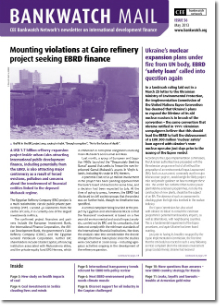EBRD Public Information Policy review should look to EU and US transparency advances

Bankwatch Mail | 10 May 2013
This year’s flurry of reviews to EBRD sectoral, country and operational strategies has given civil society organisations plenty to think about and provide input on. However, in the case of at least one of the reviews, we already have a pretty good idea what we will say. Because we’ve said it before – several times.

This article is from Issue 56 of our quarterly newsletter Bankwatch Mail
Browse all articles on the right
The EBRD’s Public Information Policy (PIP) was, a few years ago, steps ahead of information policies at similar banks such as the European Investment Bank.
Yet as time has gone on, successive policy revisions have failed to bring significant changes to the PIP, while other institutions have moved forward. The impression is that the EBRD’s notoriously opaque countries of operations have changed the bank when it comes to transparency matters, rather than the bank changing them.
Beyond the international financial institutions there have been other significant developments taking place.
Transparency standards set by the Dodd-Frank Act in the United States, as well as the proposed European Union Accounting and Transparency Directive, bring stricter reporting rules for the extractive and financial services industries. They set a new benchmark for transparency, and reject claims principally from the extractives industry regarding competitive disadvantage, the need for confidentiality and demands for exemptions.
The new financial regulation rules potentially have global impact, as they concern international companies registered in US and EU jurisdictions, and need to be taken on board by international financial institutions such as the EBRD, as part of the effort to create a ‘level playing-field.’
So, as we once again bring our requests to the EBRD this year on really very modest issues like improved disclosure on the environmental impacts and results of projects (especially those categorised under environmental category B), disclosure of project transition impact ratings and improved transparency of EBRD board decisions, it can only be hoped that the bank has been alive to the advances in the international arena and is prepared to reduce the excessive references to confidentiality in its transparency policy.
Improved transparency should, moreover, be viewed by the EBRD as a means to an end. Access to more information in a timely fashion can be a crucial element in empowering the public to protect its interests while also helping to improve dialogue on development issues.
Ensuring ‘meaningful’ stakeholder engagement in decision-making related to EBRD investments will, though, require a shift in the organisational culture of the bank, rather than merely tweaking its procedures for public participation.
Read more
A public consultation on a new draft of the EBRD’s PIP is scheduled for Autumn 2013. Further information is available at:
http://www.ebrd.com/pages/about/policies/governance.shtml
Tags: BW Mail 56
Never miss an update
We expose the risks of international public finance and bring critical updates from the ground. We believe that the billions of public money should work for people and the environment.
STAY INFORMED
